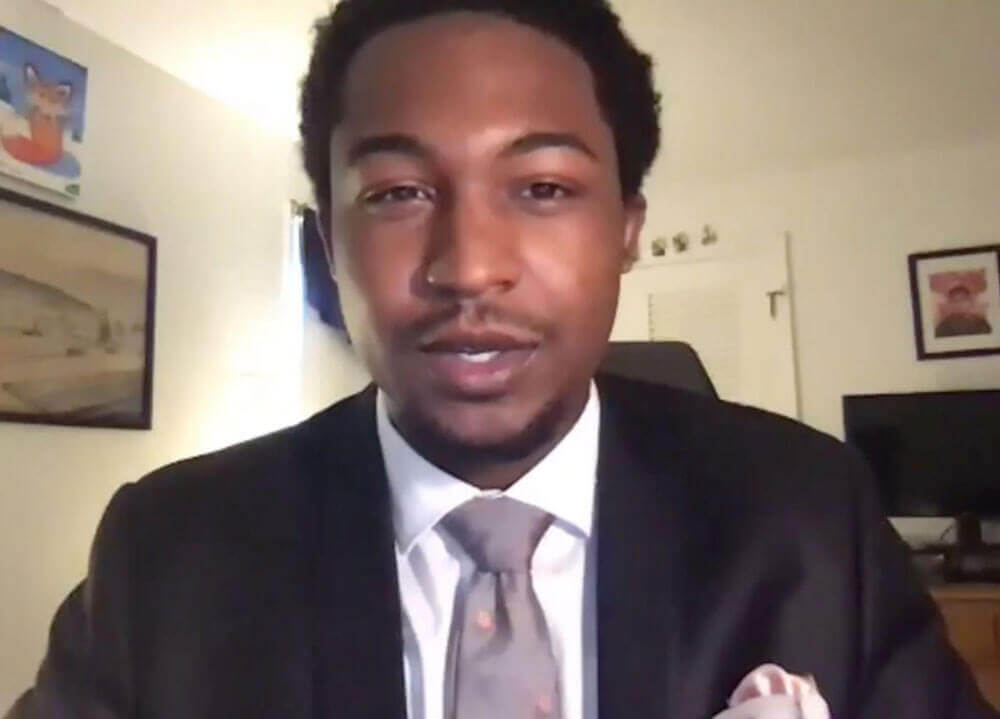
Becoming an ally to the Black Lives Matter movement requires education and action, panelists urge
June 19, 2020

June 19, 2020

Presented by Quinnipiac's Black Law Students Association, with support from the university's Student Bar Association, the webinar, “Why Black Lives Matter: A Look at Systemic Racism and Accountability,” facilitated candid dialogue around centuries-old issues that were reignited by the recent killings of Ahmaud Arbery, George Floyd, Breonna Taylor, Rayshard Brooks and other Black Americans.
“One cannot deny that the present toxicity in our country can’t be filtered out by masks,” George Morgan Jr., JD `21, president of the Student Bar Association and one of the webinar’s moderators, told the several hundred attendees.
Morgan and co-moderator Camille Lavache, JD `22, questioned the five panelists on a range of subjects, including police brutality and the Justice in Policing Act of 2020; institutional discrimination and the socialization of racism; white privilege and white fragility; and the future of the Black Lives Matter movement.
“The Black Lives Matter movement is a continuum of what Black people have been fighting for forever,” said panelist Gloria Holmes, professor emerita of the Quinnipiac School of Education.
While the solidarity between people of different cultures at recent Black Lives Matter protests has Holmes feeling optimistic, she lamented that Black people still had to affirm their personhood by carrying signs just like in decades past. She believes in sharing their perspectives and stories with white Americans.
“If I am not able to share, I don’t know how I’ll get them to understand,” she said, adding, “when white people talk to each other about race, racism and oppression, it can be like an echo chamber.”
Panelist Don Sawyer, vice president for equity and inclusion and chief diversity officer at Quinnipiac, agreed.
“White people have the responsibility to educate themselves, but when I have a student in my class, it is my duty to share and hope that there is some sort of transformation,” Sawyer, who is also an associate professor of sociology, said. “As an educator, that’s the way that I approach it.”
Panelist Michael Jefferson, a community activist, attorney and a member of New Haven’s Civilian Review Board, argued that Black Americans should focus less on teaching white people about racism and more on reversing socialized and professionalized racism.
“Whites, to some degree, are socialized to feel they are superior, while Blacks harbor sentiments that are self-hating in nature,” Jefferson said.
Violence against Blacks by law enforcement, Jefferson continued, is born out of the socialized belief that Black people are inherently criminals. Fellow panelist and attorney, Robert Pellegrino, author and partner at Pellegrino & Pellegrino, shared Jefferson’s view.
“I don’t believe a white person can grow up in America without harboring racist sentiments,” Pellegrino said.
Pellegrino, who is white, asserted that the institutional changes our country needs can only be achieved after white Americans have reckoned with their latent racism.
“The road to becoming an anti-racist is harder to walk than the road to being a racist is,” he said. “We have to educate ourselves and we have to educate each other.”
All panelists agreed on the importance of allies in the ongoing fight for racial equality and justice, and that support must be expressed through more than words.
“Ally is not just a noun,” reminded Sawyer, “it’s an action word.”
Quinnipiac Today is your source for what's happening throughout #BobcatNation. Sign up for our weekly email newsletter to be among the first to know about news, events and members of our Bobcat family who are making a positive difference in our world.
Sign Up Now